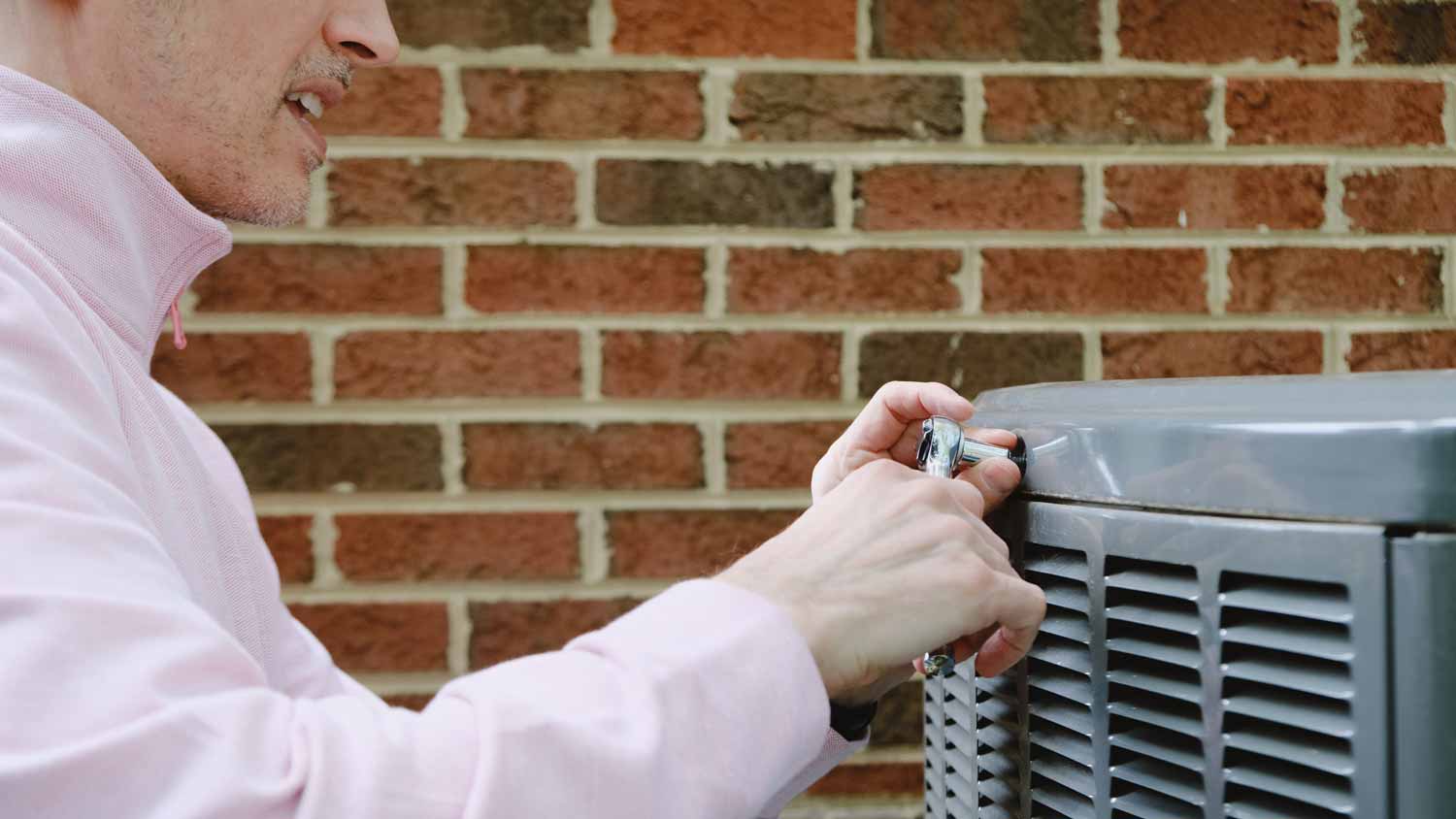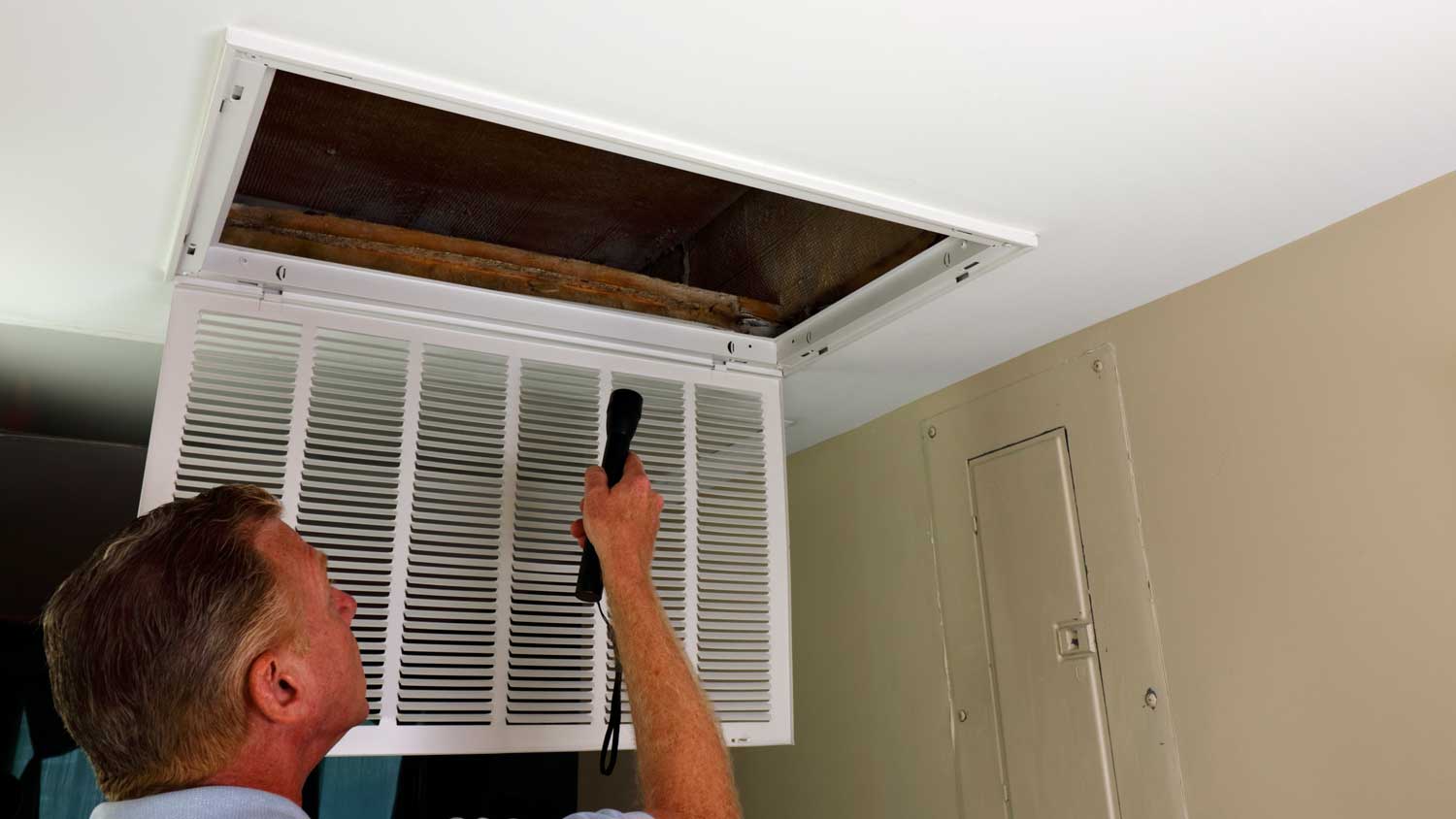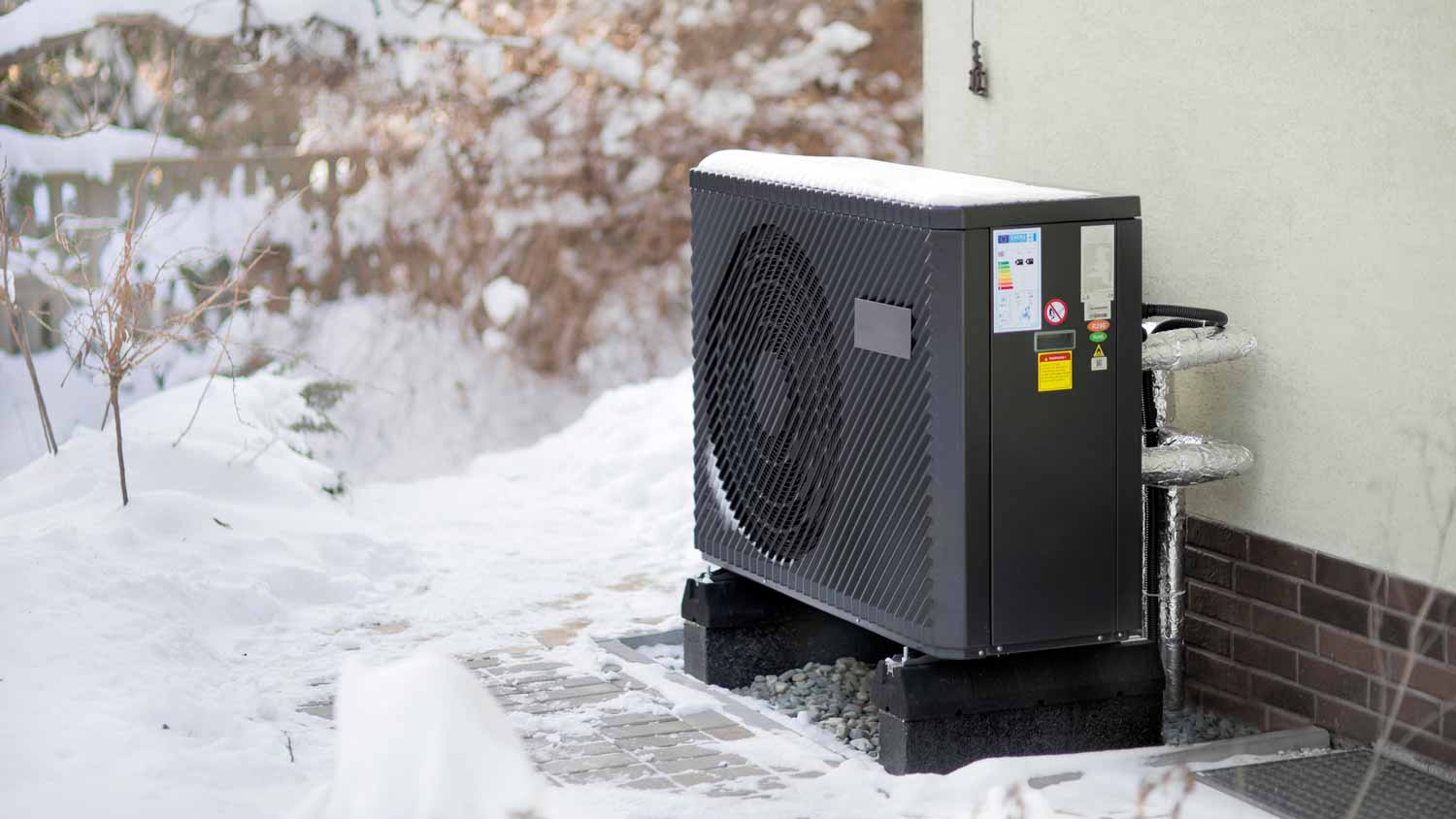A Frozen AC Unit Won't Always Fix Itself—Here's How to Repair It
Don't sweat it—this is how to fix a frozen AC unit like a pro


When an AC unit goes from cooling down your home to turning into a literal ice box, it's easy to panic—but there’s no need. Oftentimes there’s an easy way of unfreezing an AC unit that you can take on yourself. This guide will help you troubleshoot a frozen AC unit so you can decide whether to DIY or bring in a pro.
Why Do I Have to Fix a Frozen AC?
Ice on your AC unit can lead to costly damage, so you’ll want to address it ASAP. For instance, if the evaporator coils stay frozen for too long, they can crack or break. Frozen AC units also experience reduced airflow, which means they're much less efficient at cooling your home, driving up energy costs.
Will a Frozen AC Fix Itself?
It’s possible that the problem will go away on its own, but you’d be leaving yourself open to a lot more potential damage if you sit back and hope for the best. It’s better to take care of a frozen unit right away in case there is a larger problem hiding under all that ice. The faster you catch these underlying issues, the less you're likely to pay to fix them.
How Much Does It Cost to Fix a Frozen AC Unit?
In many cases, you can fix a frozen AC unit with just a few basic tools and supplies, which shouldn't cost you more than $40 at the hardware store. However, if you hire a local air conditioning repair service, you'll have to pay for labor. The cost to repair AC units usually starts with a $100 to $250 service fee for one hour of work. You'll then likely pay between $50 and $150 for each additional hour.
Common Causes of a Frozen AC Unit
There are several potential causes behind a frozen AC unit. Some causes, such as a dirty air filter, are easy fixes, while others, like low refrigerant levels, are best left to the pros.
Low refrigerant: When refrigerant is too low, there's less pressure to push it through the appropriate tubes. This means that the refrigerant takes longer to get through your AC unit's cooling period, making it too cold once it reaches the evaporator coils.
Insufficient airflow: A dirty filter, clogged coils, or a broken fan can reduce your AC unit's airflow. When this happens, the system can't effectively pull warmer air from your home into the unit, which can lead to frozen condensation on the coils.
Broken mechanical parts: Your AC unit comprises a variety of mechanical parts that ensure it works sufficiently. If any of those parts fail, such as the fan, it can throw off the unit's delicate pressure system and lead to problems like freezing.
Cold outdoor temperatures: If you're running an AC unit when it's too cold outside, the outdoor temperature can reduce the system's refrigerant pressure, leading to ice buildup and a frozen unit.
The EPA prohibits handling AC refrigerant without a license. This is one DIY project you shouldn’t try—having a licensed AC repair technician refill your AC refrigerant is the safest (and legal) option.
How to Fix a Frozen AC
The way to fix your frozen AC unit depends on the root cause of the issue. But there are several steps you can take to troubleshoot common AC problems and potentially fix them yourself, depending on their complexity.
Turn Off the AC
Before you do anything, turn off the AC unit as soon as you notice it's frozen. The longer it runs while frozen, the more damage it can cause. Start by switching the unit's control panel off. To prevent the unit from turning back on automatically, you should also locate the circuit breaker connected to the unit and turn that off as well.
Once the system is off, wait for all of the ice on the unit to thaw. This might take up to 24 hours, but there are ways to speed up the process. Just make sure you do not try to chip off the ice yourself, as doing so can damage your system.
Start the Fan to Help Thaw the Unit
If the outdoor temperature is well above freezing, you can use your system's fan-only setting to help thaw and dry the coils. When switching to fan-only, make sure you use the manual fan setting and not automatic.
Let the fan run for as long as you need to in order to thaw the coils. While it's running, make a note of any airflow problems or condensation that occurs while the cool setting is off.
Note: If your fan won't turn on or it's blowing very lightly, you might need a new fan motor to fix the problem, in which case you should hire a nearby AC repair pro to replace it.
Check the Air Filters

Once the ice thaws, turn the unit off again and inspect the air filters. Remember, dirty filters aren’t only gross, they also lead to poor airflow, which can cause your unit to freeze. An effective air filter should look clean to the naked eye; even a light layer of dirt or dust can reduce your unit's airflow and freeze it.
Replace the dirty filter with a new one, then turn the system back on and see if it fixes the problem. Let it run for several days, keeping an eye out for any signs of freezing; if it's still not working, proceed to the next step.
Examine the Coils
Once you’ve tried cleaning the air filter, turn the unit off and inspect the evaporator coils. If the coils look dirty or clogged, you can try cleaning them yourself.
For this task, you'll need the following:
A soft-bristled cleaning brush
Commercial coil cleaner
Safety gloves and goggles
Once you've donned your gloves and goggles, grab the cleaner and lightly spray the coils, then use your soft-bristled brush to clean them gently. Finally, spray the coils with warm water to rinse off the cleaner and wipe the coils dry. Make sure to remove all moisture before turning the AC unit back on to test its function. Give it a few days, and if it's still on the fritz, go to the next step.
Call a Pro
If replacing the filter and cleaning the coils didn't solve your frozen AC problem, it's probably time to bring in an HVAC expert. It might be that your refrigerant levels are low due to a leak or that mechanical components within the system are broken. Either way, it's best to call in the professionals to safely diagnose and fix the problem without causing further damage to your system.
How to Prevent an AC Unit From Freezing
Here are some simple things you can do year-round to keep your AC unit in working order when the cold weather hits.
1. Replace the Filter Regularly
Since dirty filters can lead to poor airflow, you'll want to replace them regularly to prevent freezing. You should replace most air filters every one to three months, depending on the unit. Check the unit manufacturer’s recommendations for your specific AC system.
2. Remove Vent and Duct Obstructions

Every now and then, inspect your vents and ducts to make sure they're not being blocked by a heavy rug, your dog’s luxury bed, or other objects. These obstructions can reduce your unit's airflow, making it vulnerable to freezing.
3. Schedule Regular Maintenance
Hire a local HVAC technician to inspect your AC unit for any potential problems at least once per year in early spring before the first balmy days of summer vacation. For best results, a pro should also inspect it once in the fall before the temperatures drop, especially if you have a combined heating and cooling unit.
4. Don't Run the Unit at Low Temperatures
If the outdoor air temperature is cooler than 60 degrees Fahrenheit, it's best to leave your AC unit off to prevent freezing. A programmable thermostat comes in handy here since it can automatically turn the unit off when your home reaches a certain temperature.
DIY vs. Hiring a Pro

Many frozen AC problems have quick fixes that you can tackle on a Saturday afternoon, like swapping out the filter. However, some problems are more complex to diagnose and treat, such as leaky refrigerant or mechanical problems, in which case it's best to let an expert handle them so as not to cause further damage. These problems can also be dangerous, and sometimes EPA regulations won’t permit you to fix them yourself.
Frequently Asked Questions
If left untreated, a frozen AC unit can lead to costly damage, especially to the compressor and evaporator coils. When ice forms on the evaporator coils, they become brittle and more susceptible to breaking. Plus, a freeze makes your AC system much less efficient, which means it's wasting energy and costing you more in your monthly energy bills.
Yes, a frozen AC unit can affect your indoor air quality since the reduced airflow won't be as effective at removing air pollutants, like dust and other allergens. Additionally, ice around the unit can create excess moisture, leading to mold and mildew that can damage your home if you don’t catch it early.
No, it's not safe to keep using your unit when it's frozen. Not only can running a frozen unit lead to damage, but it can also potentially overheat, making it a fire hazard. Therefore, it's always best to turn off the AC unit as soon as you notice any ice.
This depends on the extent of the freezing. Some ACs only need an hour or two to thaw out, but others may need a full day to completely unfreeze. Once you turn off the system to let it unfreeze, check it periodically to make sure the drain pan doesn’t overflow. When you turn the system back on, keep an eye on it to ensure it doesn’t start freezing again.
You should plan to change your AC unit's filter every one to three months, depending on the manufacturer's recommendations. You should also clean the coils at least once per year, but if you have pets or someone in your household has allergies, you might need to clean them more often. Fortunately, many pros will clean the coils and change the filter for you during an inspection, which you should schedule once or twice per year.





- Furnace Repair
- Air Conditioning Repair
- HVAC Repairs
- Furnace Installation
- Wood & Pellet Stove Repair
- Dehumidifier & Humidifier Repair
- Heat Pump Companies
- Swamp Cooler Repair
- Wood Stove Services
- HVAC Companies
- Commercial A/C Repair
- Geothermal Installation
- Air Conditioning Installation
- Boiler Repair
- 24 Hour Furnace Repair
- Geothermal Repair
- Heat Pump Repair
- Humidifier Installation
- Thermostat Repair
- Thermostat Installation
- Nest Installation
- Heating & Cooling
- Heating Repair
- Furnace Cleaning
- Furnace Tune-Up
- HVAC Technicians
- Subcontractors
- Furnace Maintenance
- Plumbing & Heating Companies
- Wood Stove Inspection
- Mini Split Installation
- Wall Heater Repair
- Duct Installers
- How to Clean Your AC So It Runs All Summer Long
- Why Is the Outside AC Unit Not Turning On, But the Inside Is? 9 Common Reasons
- How Long Do AC Units Last? Here’s the Average Life Span
- How to Troubleshoot Your Air Conditioner: 12 Common Problems and Tips to Fix Them
- 11 Reasons Your AC Is Blowing Hot Air
- 5 Reasons Your AC Is Freezing Up and How to Fix It
- How to Fix an AC Leak: A Step-by-Step Guide
- Here’s Who to Hire to Clean and Repair a Window AC Unit
- Is It Bad to Keep Turning Your AC On and Off?
- 6 Signs You May Have an AC Coolant Leak and Tips to Prevent It











